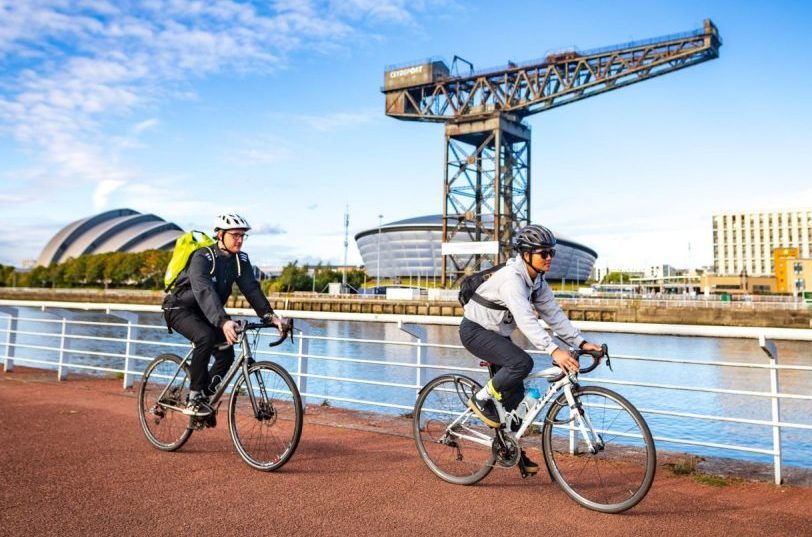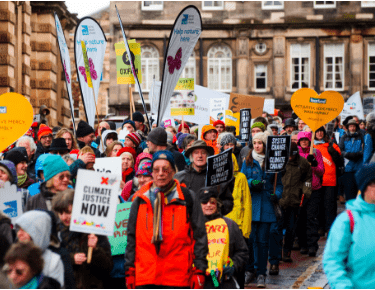This Campaign has now finished
| When it ran | March to May 2022 |
| What we did | We created a central database of climate related local election events, manifestoes produced by our members and information on why local elections are important for climate. We encouraged people across Scotland to speak up for the climate and nature emergency by using their voices to call on party candidates to commit to action. |
| What changed | The campaign raised awareness among audiences about the importance of local government’s role in tackling climate change, protecting and enhancing nature, and ensuring a fair transition to a low carbon future. |
Together, we can speak up for the climate and nature emergency this year. You can use your voice to call on local government party candidates to commit to action at the elections on 5th May.
Decisions taken by local governments play a big part in tackling climate change, protecting and enhancing nature, and ensuring a fair transition to a low carbon future.
Some of the key areas of that local governments are responsible for that can contribute towards emissions reductions are:
- Transport;
- Circular economy;
- Communities;
- Planning;
- Buildings and energy;
- Food and other procurement.
Read this blog to hear from our members working on active travel, circular economy and food on how councils can take action on them to reduce emissions.
Election events calendar
The calendar below lists the climate related events happening ahead of the local government 2022 elections on 5th May.

Transport
Transport continues to be Scotland’s single biggest source of carbon emissions, having increased for much of the past decade.
Road transport accounts for nearly two-thirds of these emissions. Local government is responsible for the maintenance of the vast majority of Scotland’s road network, and will be central to efforts to reduce emissions from road transport.
Local government has a leading role to plan in the provision, and management, of active travel infrastructure – and will also be vital to the delivery of the Scottish Government’s target to reduce private car mileage by 20%.
Cycling UK in Scotland, Sustrans Scotland and Spokes are campaigning for local governments to take more action to champion active travel and deliver improvements to cycling, walking and wheeling infrastructure.
Read lots of useful election information from Spokes, the Lothian Cycle Campaign and their analysis of party manifestoes for Edinburgh and the Lothians
Communities
Keep Scotland Beautiful’s manifesto calls for local government to involve, support, and empower communities and young people to take actions toward a cleaner, greener and more sustainable Scotland.
Planning
Local Government planning responsibilities (both development planning and development control) are essential to the transition to low carbon living. Good planning decisions can facilitate such a transition, while poor ones can ‘lock in’ high carbon emissions.
Development planning must help to ensure that, in future, there is no provision for further airport expansion and that car-dependent, out of town retail or office developments are discouraged. There should be a presumption in favour of “20-minute neighbourhoods” rather than separate business/residential areas unconnected by active/public transport.
Buildings and energy
Local government has both a regulatory and operational role in relation to reducing emissions from buildings and energy use. Building standards systems, policies and funding must be appropriate to delivering emissions reductions from buildings like schools, libraries, offices and leisure facilities.
Much of the emissions’ reductions from building will relate to energy efficiency and/or energy use, and local authorities should promote and facilitate the generation and use of renewable energy, as well as reducing the demand for energy by efficiency measures.
Food and other procurement
Reforming the food system (including its production, processing, distribution, and consumption) is a vital part of addressing the climate crisis. Local government has a crucial role to play in supporting such a transition, including promoting and procuring local, sustainable food.
Procurement decisions do not only apply to food. Local Authorities budgets support the purchase of millions of pounds of goods and services, and these should be subject to policies that drive demand for sustainable, low carbon goods and services.

